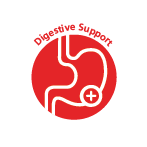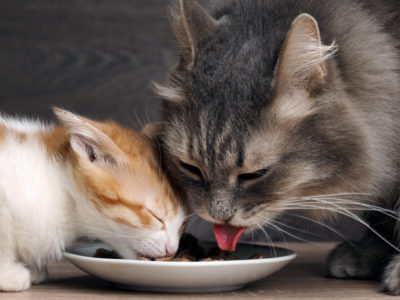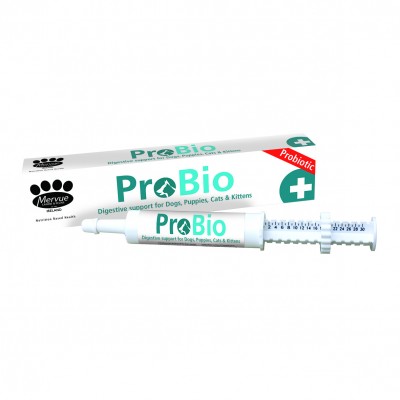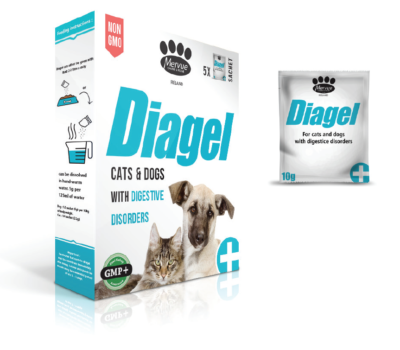- +353 21 422 0397
- info@mervue.ie
- Mon - Fri: 09:00 - 17:00
 Cat upset stomach, cat vomiting
Cat upset stomach, cat vomitingDigestive upsets, upset tummy and upset stomachs are common in cats and vomiting is generally more commonly seen than diarrhoea.
The most common reason for young and generally healthy cats to get an upset stomach is due to dietary indiscretion. Another common cause for vomiting in cats is hair balls, especially in long haired cats. Changes in diet, over feeding and poor-quality food can all lead to vomiting. Like humans, cats have good bacteria in their intestines which aid in the digestion of food and they also synthesise many essential vitamins.
 Any digestive upset, can negatively impact the numbers of good bacteria and may allow bad bacteria to become established. Similarly, antibiotic treatment may alter the balance between good and bad bacteria in the intestine and lead to digestive upset. Therefore, it is important to replenish the good bacteria in the intestines to aid digestion and to provide additional vitamin sources and energy sources until the condition resolves and the cat returns to normal digestive health.
Any digestive upset, can negatively impact the numbers of good bacteria and may allow bad bacteria to become established. Similarly, antibiotic treatment may alter the balance between good and bad bacteria in the intestine and lead to digestive upset. Therefore, it is important to replenish the good bacteria in the intestines to aid digestion and to provide additional vitamin sources and energy sources until the condition resolves and the cat returns to normal digestive health.
After weaning, cats no longer require milk in their diet and their ability to digest lactose (the sugar in milk) is greatly reduced. Despite the images of cats drinking from a bowl of creamy milk, approximately 85% of cats are lactose intolerant and they lack the enzyme lactase that is needed to digest the lactose in milk. The lactose remains in their intestine and leads to diarrhoea. Hair balls in cats can lead to constipation.
There are many other causes of vomiting and diarrhoea in cats, including medical conditions such as kidney disease, liver disease, foreign bodies (e.g. string), cancer and parasitism. It is very important therefore that if your cat experiences prolonged vomiting or diarrhoea that does not resolve within 24-48 hours that you should consult your veterinary surgeon. Cats will often stop eating when they have digestive upset, reduced feed intake in cats for a period of three days or more can have serious consequences and it is very important to get cats to return to eating as quickly as possible.
 PROBIO PLUS is a recovery gel containing a probiotic called Enterococcus faecium which plays a crucial role in digestive health. Enterococcus faecium acts as a defending barrier against invading bad bacteria, aids in the digestion of food and the harvesting of energy harvest from the diet. In addition, Enterococcus faecium provides nutritional support for the cells lining the intestines and stimulates the development of the intestinal immune system. Many probiotics such as Enterococcus faecium produce short chain fatty acids promote normal gut motility. Changes in the normal intestinal bacteria have been linked to chronic intestinal diseases in both dogs and cats. PROBIO PLUS also contains dextrose which acts as a source of energy, which is especially important if your cat is not eating and it also contains electrolytes to replace those that have been lost through vomiting and diarrhoea. PROBIOPLUS also contains a range of B vitamins to help to restore appetite and support normal metabolism and antioxidant vitamins E and C to counteract damage caused to intestinal cells.
PROBIO PLUS is a recovery gel containing a probiotic called Enterococcus faecium which plays a crucial role in digestive health. Enterococcus faecium acts as a defending barrier against invading bad bacteria, aids in the digestion of food and the harvesting of energy harvest from the diet. In addition, Enterococcus faecium provides nutritional support for the cells lining the intestines and stimulates the development of the intestinal immune system. Many probiotics such as Enterococcus faecium produce short chain fatty acids promote normal gut motility. Changes in the normal intestinal bacteria have been linked to chronic intestinal diseases in both dogs and cats. PROBIO PLUS also contains dextrose which acts as a source of energy, which is especially important if your cat is not eating and it also contains electrolytes to replace those that have been lost through vomiting and diarrhoea. PROBIOPLUS also contains a range of B vitamins to help to restore appetite and support normal metabolism and antioxidant vitamins E and C to counteract damage caused to intestinal cells.
 DIAGEL has been specifically developed and formulated for cats that experience diarrhoea or constipation. DIAGEL contains psyllium which absorbs liquids and toxins and helps to normalise the faeces in the case of diarrhoea. The ability of DIAGEL to absorb liquid, also helps to soften the stools and aid passing of stools in cats experiencing constipation. DIAGEL also contains dextrose as an energy source and several B vitamins. The B vitamins are typically synthesised by the good bacteria in the normal health intestine, so their supplementation during times of digestive upset is very important.
DIAGEL has been specifically developed and formulated for cats that experience diarrhoea or constipation. DIAGEL contains psyllium which absorbs liquids and toxins and helps to normalise the faeces in the case of diarrhoea. The ability of DIAGEL to absorb liquid, also helps to soften the stools and aid passing of stools in cats experiencing constipation. DIAGEL also contains dextrose as an energy source and several B vitamins. The B vitamins are typically synthesised by the good bacteria in the normal health intestine, so their supplementation during times of digestive upset is very important.
Copyright © 2019 Mervue Laboratories. All Rights Reserved.